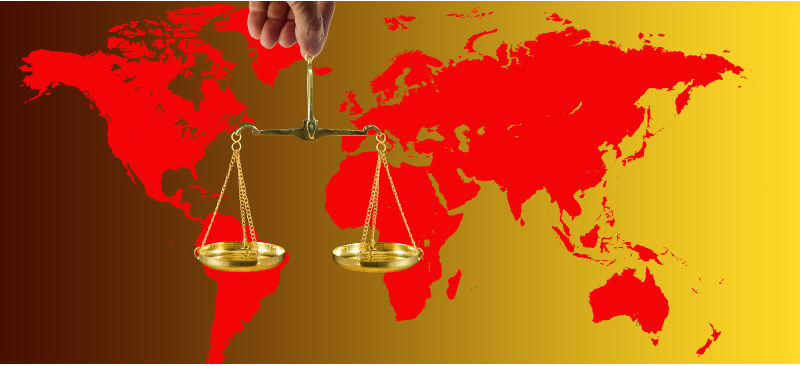Obtuse China Policy and the "International Rules-Based Order" in a Trumpian world
November 25, 2024
In the ballyhooed, strident context of Trumpian change, if not, hysterical disruption, it is especially important to pinpoint and consider the real and the “factually alternative” content of Chinese foreign policy and international relations.
Much analysis still originates with the continuing fear in the West of a hegemonic Chinese takeover. China is alleged to challenge US economic, political and military leadership by ignoring the “rules” and cleverly practicing new hegemony to “re-order existing institutions[transferring] both funds and decision-making from developed liberal democracies to the Global South” [See “China Seeks to Take the Lead in a Trump 2.0 World”, The Australian, Nov. 20, 2024, p. 9].
To “expand” and “reform” is not the same as “to replace”. Chinese UN support for Third World development has always been significant; and China is not seeking to create new organisation to replace American “hegemony” with its own “hegemony”. In the context of today’s spreading hub-bub, what might we learn from history? The importance of China’s historical commitment to staying within and participating in the UN has been largely ignored. In the wake of learning from the desperate conditions culminating in World War II, the UN, emerged as an American-based concept of an exciting new rules-based order that sponsored responsible great power and collective leadership in relation to peace and development. While one may complain about the history of UN bureaucracy and the need for UN political reform, the UN has spawned a range of critically important initiatives supporting new institutions and new international law.
While the Soviet Union, another “Communist” regime acquired its two UN seats, ostracised China’s new “Communist” government suffered the slings and arrows of American-supported fiction that Taiwan represented all the people of China This was truly a crippling institutional deficit that ignorantly distracted attention away from the UN’s basic mission for just peace and development. Chinese sovereignty was relentlessly ignored, and even reviled, yet in the face of extraordinarily insulting attempts at China’s humiliation, Beijing rather than attempting to create a contrary world order, continuously and vigorously sought UN membership.
Facing the sustained and explicit US policy of exclusion, China firmly rejected “dual representation” and solely acquired the UN China seats in 1972 with the strong mandate coming from the majority of the 26th UN General Assembly which unseated Taiwan. In this author’s opinion, such a fundamental correction should have been worthy of the Nobel Peace prize in recognition of the diplomacy of China’s Prime Minister Zhou Enlai. China’s s current emergence as the world’s second largest economy has come with Chinese expectation of greater participation, respect and influence in regional and world affairs. If the Chinese are now moving beyond Deng Xiaoping’s foreign policy “low posture”, this is still with the reservation that China does not seek to dominate the world. To be clear China expects to have influence in both the UN and regional organisations such as BRIC, but Chinese foreign policy is not foolhardy and is still recognises the key importance of state sovereignty; and this is fundamentally reinforced in a continuing comparative perspective on the folly of imperial overreach. The world is too complex, and state sovereignties are so robust as to pre-empt universal empire. Universal empire, which spawns narrowly prescribed international order and spiralling conflict, is beyond the resources of any state. In this context, alliances are regarded as fickle compared to “partnership”, based on genuine economic cooperation and collective security. Furthermore, would it not be remiss to recall that international order and law helped facilitate China’s giant modernisation project which significantly expanded the parameters of international trade?
As for the law and the Chinese, the “rule of law” is a continuous struggle, anywhere. It is no mere collection of laws. It is a culture, supporting justice as “equality before the law”. In this, the law is a covenant that aspires to a great civic morality. As it pits equality against unreasonable power it is constantly challenged in domestic and international politics. This reality is reinforced in its current predicament in its most important home country, the USA. Correlating law and moral leadership is a very difficult synthesis as suggested in Mencius, wherein Mencius endorsed the saying, “Virtue alone is not sufficient for the exercise of government; laws alone cannot carry themselves out.”. The pluses and minuses of the ledger of Chinese legal reform since 1978 are discussed in great detail across the author’s books, for example: China’s Struggle for the Rule of Law; Law in Justice in China’s New Marketplace; New Crime in China: Public Order and Human Rights; China’s Supreme Court; China Change and Confucian Benevolence: Human Values, Truth and Policy.
To summarise here several related findings, the first decades of “open door” reform after 1978, witnessed China’s successful re-joining of the “international order” as well as great and genuine strides in domestic legal reform. Such reform was anchored in the serious need for domestic political stability and the facilitation of unprecedented market reform and international trade. Importantly, the debated distinction between “rule of law” as distinct from a mere set of rules resulted in raising the concept to the formal level of national policy, as legitimated in the Party’s own ideology. Much of related reform is still in place and contrary to the persisting assumptions of hostile Trumpian opinion, Chinese talk of reform was not a clever tactic to disarm unassuming, innocent Americans who now so disingenuously lament having opened the door to Chinese economic growth at the expense of American workers. Imagine American “capitalists” were suckered by Chinese “socialists” in international trade and investment! In sum, the highly politicised, and the incorrect, unqualified discounting of China, as contradicting “the international rules-based order”, is irresponsibly retrogressive, given today’s Trumpian reiteration of navel-gazing “normalcy”.
